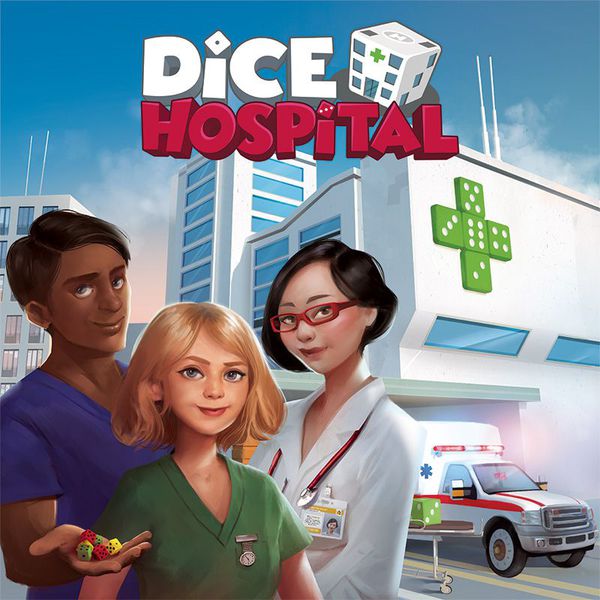There are few things more emblematic of a game than that of the six-sided die. With its small, unassuming presence, these tiny cubes of randomized chance can carry rather significant meaning. With one throw of the dice, the results can make your day or ruin your fun entirely. Fortunes have been won and lost thanks to the whims of dice, as have countless, countless games. Their very nature exudes the aura of luck – as well as everything, for better or worse, that luck represents.
There is a reason that many, many board games use dice. Their concept is simple, their impact easy to understand, and they serve the dutiful purpose of providing variance to outcomes in games that desire it. All of these are valuable and even admirable traits, which is why they’ve been a permanent fixture of board games for thousands of years. Because of their lengthy association, it generally is assumed that if a game utilizes dice, it means that luck is involved; the more the rules of a game rely on rolling dice, the more unpredictable they become. Which for some is part of the game’s enjoyment. But it’s also why for many gamers (especially certain archetypes), their mere presence is enough to give them pause. Dice aren’t just a symbol of variation but of the unknown, and some people don’t want to tie their possible enjoyment of a game to something completely outside of their control – even in the cases when the dice may work to their advantage.
For tiny pip-laden cubes, they certainly evoke a lot of opinion.

In recent years, however, game designers have started utilizing dice in ways other than solely to predict an outcome. We have seen games where dice are stacked atop one another or where your goal is to arrange them in certain patterns. Dice have been used as resources, denoting how many goods of a certain type are on a given space, and as warriors on a battlefield, demonstrating their relative strength to one another. Dice have become items you can upgrade by visiting various worker placement locations, and they’ve also become the workers of whom you’re then placing.
And now, with the advent of Dice Hospital by Alley Cat Games, dice are now patients you are trying to save. Their pips? Their respective health. In this game, rolling the dice a life and death operation.
In this hour long worker placement game, 1-4 players are managing respective city hospitals with the goal of trying to treat and discharge as many healthy patients as possible. (You know, like a normal hospital.) To do this, each round players must assign hospital staff and workers to various spaces within their hospital with the intent of making their patients – the dice – healthier. Each round, new randomly rolled dice arrive at the hospitals via ambulance, and it’s up to the players to prioritize the needs of the various Pippins and Pipers under their care. In Dice Hospital, the die faces represent the health of the patients.
With a constant influx of new patients and limited space, however, providing care quickly is important. If, through various actions and equipment, the dice value reaches 7 or higher, the patient is healed and is successfully discharged. If, on the other hand, the value of a die reaches zero, then that die, well, dies. Discharges provide you VP, whereas Fatalities count against you – as one would expect. At the end of eight rounds, whichever hospital has the highest score will demonstrate that they have what it takes to run the best hospital in the region.
We have seen other games utilize dice in unconventional means, even as representations of individual units, but what makes Dice Hospital so intriguing is how much its theme is molded around the concept of dice as individuals whom you’re trying to help rather than the other way around. They aren’t a resource or a worker insomuch as the thing that needs saving. And it’s executed particularly well. In isolation, many of the game’s mechanics feel familiar, but this particular assemblage, when paired with that of hospital operations, creates a particularly worthwhile experience.
It’s not every day when you want to go to the hospital. This, however, is one of those occasions.
For a variety of ethical and legal reasons, though, we can’t actually send you to a real hospital to work the real experience…anymore. So instead we’re offering up a copy of the game that can sometimes feel like the real thing!
But enough time for chatting. Grab your coat and prep the beds! There’s a new batch of patients about to arrive and time is short. It’s time to roll the dice…figuratively speaking.
From now until December 9th you can check the contest out on our Facebook page, or by entering below. Just follow the entry form and proceed with the contest. The more you do, even if just one, you still have a better chance than not entering at all. Of course you’re welcome to do that too. But your odds of winning drop to zero. No pressure or anything.
The Fine Print: The Cardboard Republic, in conjunction with Alley Cat Games is giving this game away strictly for entertainment purposes. This act is not a paid endorsement by Alley Cat Games or any other entity. This contest is open to individuals only. Staff members of The Cardboard Republic and Alley Cat Games are not eligible to participate. For winners outside of the Continental US, the publisher reserves the right to request they cover part or all of the shipping costs.
